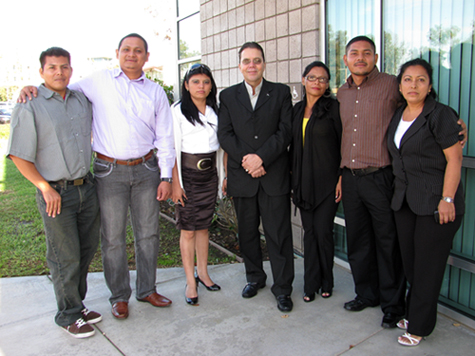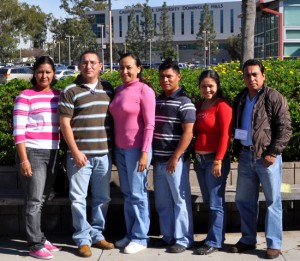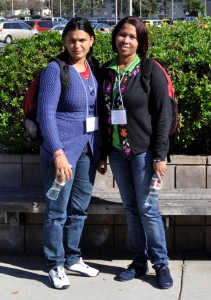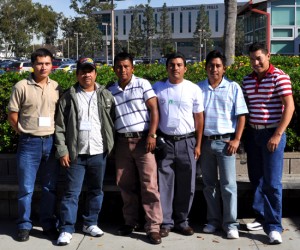The first cohort of awardees of the Scholarships for Education and Economic Development (SEED) have arrived for a six-month course of study at California State University, Dominguez Hills. The SEED Scholars, who are from Central America and the Dominican Republic, will examine vector-borne disease control in an exclusive program taught by university faculty and staff, as well as Los Angeles County health professionals. The group was welcomed to the university at a reception in January attended by the Honorable Jose Alberto Acevedo Vogl, consulate general of Nicaragua, Mildred García, president of CSU Dominguez Hills, Margaret Gordon, dean of the College of Extended & International Education (CEE), administrators, faculty, and staff. One scholar from each visiting country also addressed the assembled guests, including Maria Paulino, an entomology assistant from the Dominican Republic; Estanislao Rivera, a spray crew chief from El Salvador; Rodrigo Flores, a chief technician from Guatemala; and Diego Cesar Aguilar, a vector-borne disease technician from Nicaragua.

“We are proud to partner with many great organizations and the U.S. agencies for international development to make this important program possible,” said García in a speech delivered in both English and Spanish to the 20 students. “You will have the skills to become leaders to improve the quality of life in your local community and the world. I applaud you and I am proud that you are here at CSU Dominguez Hills.”
The curriculum, which is presented primarily in Spanish by university faculty and local practitioners, addresses transmissible disease vector control in partnership with the Greater Los Angeles County Vector Control District and UCLA-Harbor Women’s Health Clinic.
In a recent class taught by Erika Valdez, SEED Program assistant and instructor, SEED Scholars discussed their goals for their time as students at CSU Dominguez Hills.

Tony Mena, who works as a health promoter with the Ministry of Public Health and Social Welfare in Tocoluca, El Salvador, says that one of the major challenges in his field is the flood season.
“Winter starts in May, so right around that time, we start having a rainy season for two weeks,” he said. “We have to start seeing about evacuating families. Some of the challenges my community faces are in terms of preparation.”
Vilma Aguilar, who is a health promoter with the Ministry of Public Health and Social Welfare in San Luis Talpa, El Salvador, added that the temporary shelters are provided only for women and children.
“Generally, the men have to stay behind to take care of their personal [property],” she said.
Paulino said that the influx of immigrants from nearby Haiti is a major factor to be considered when caring for her community.

“Many Haitians come into the country with malaria,” she says. “It makes it hard for my country to respond because [everyone consumes] the resources of stagnant water. It’s very hard for them to control the problem of malaria. Some of the Haitians do speak Spanish, and we try to get them to malaria screenings, but it’s been a challenge.”
Yennis Ferraras, who works as a secretary with the Dominican Republic’s National Center for Tropical Disease Control, says that the government’s measures to prevent malaria with mass sprayings of insecticide is often met with resistance by the Haitian transplants.
“Sometimes, we need the authorities to come with us to get the [Haitians] to comply, and to explain to them why it’s necessary to spray,” she said. “They think [the officials] are there to send them back to Haiti.”
Among the information that the SEED Scholars hope to gain from their visit to CSU Dominguez Hills is new methodology and ways of intervention. Flores said that nature is a challenge in Guatemala, the most recent disaster being the eruption of the Pacaya volcano last year. He said that he would like to learn how the U.S. deals with its most difficult health challenges.

“One of the things we’re curious about is to see what you’re doing here and see if we can replicate it,” he said. “Obviously, you’ve done something that has helped.”
The SEED program is administered by the Center for Intercultural Education and Development at Georgetown University to train nurses and other health professionals from the Dominican Republic, El Salvador, Guatemala, Haiti, Honduras, Mexico and Nicaragua. Two SEED cohorts have been funded to live and study at CSU Dominguez Hills for six months each through a USAID grant from the U.S. Agency for International Development. The current cohort is here through July, when a second cohort arrives.
For more information on the College of Extended & International Education, click here.
Translated by Erika Valdez, program assistant and instructor, SEED